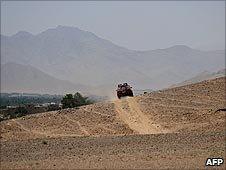Afghans say US team found huge potential mineral wealth
- Published

There are already plans to mine copper deposits
Afghanistan may have more than a trillion dollars worth of untapped mineral deposits, a spokesman for the ministry of mines has suggested.
A joint team from the Pentagon, US Geological Service and USAID has calculated Afghanistan's mineral deposits are worth at least $900bn.
Geological surveys discovered large quantities of iron and copper as well as valuable deposits of lithium.
But questions are being asked about the timing of the release of information.
The details of a US Geological Service survey of the country were released in 2007. The US assessment of the worth of the deposits was completed in December last year.
The trillion dollar calculation was reported in the New York Times on 14 June.
The BBC's Jill McGivering says that at a time of growing despair about Afghanistan and its government, the portrayal of the country as a potential goldmine could help to bolster international resolve and paint the country as a prize worth fighting for.
Lithium is an increasingly vital resource, used in batteries for everything from mobile phones to laptops and key to the future of the electric car. Bolivia boasts the largest reserves.
Afghanistan also has significant reserves of niobium, a key ingredient in hardened steel.
'Trillion-dollar resources'
Ministry of mines spokesman Jawad Omar said he could not confirm the exact value of Afghanistan's mineral wealth but had no doubt it would have a very big impact on the country's development.
If exploited, Afghanistan would become self-sufficient, he said, and no longer need foreign aid.
President Hamid Karzai's spokesman, Waheed Omar, was quoted by news agency AP as saying: "The result of the survey ... has shown that Afghanistan has mineral resources worth $1 trillion.
"This is not an overall survey of all minerals in Afghanistan. Whatever has been found in this survey is worth $1tr."
The findings were made by the US Geological Survey under contract to the Afghan government, he said.
The New York Times cited an internal Pentagon memo which said Afghanistan could become "the Saudi Arabia of lithium".
There are already plans to exploit mineral wealth in Afghanistan with Chinese backing for a copper mine at Aynak in Logar province.
'Battle for influence'
It sounds like welcome news for a country which desperately needs development, our correspondent says.
But the discovery of mineral wealth will not provide an overnight solution.
It would take years to build a large-scale mining industry and unless there is peace, it will be hard for investors to guarantee security, our correspondent says.
With so much more to fight for, it may also make a peace deal harder to forge.
If Afghanistan's strategic value suddenly increases, so too might the battle for influence between regional giants India and China, and of course the United States, our correspondent adds.
Exploiting the mineral wealth will not be easy, says Stephanie Sanok, senior research fellow in the International Security Programme at the Center for Strategic and International Studies.
"I can't think of any examples where you can extract the kind of minerals we are talking about in Afghanistan in the middle of a major military campaign.
"They not only don't have the infrastructure - road, rail and water - but they don't have basic laws and regulations that will attract investment."
But if fears over instability and corruption can be averted there is a profound opportunity for Afghanistan with its gross domestic product of $12bn, says Ms Sanok.
"It is a huge employment opportunity... that will go a long way in counter insurgency."